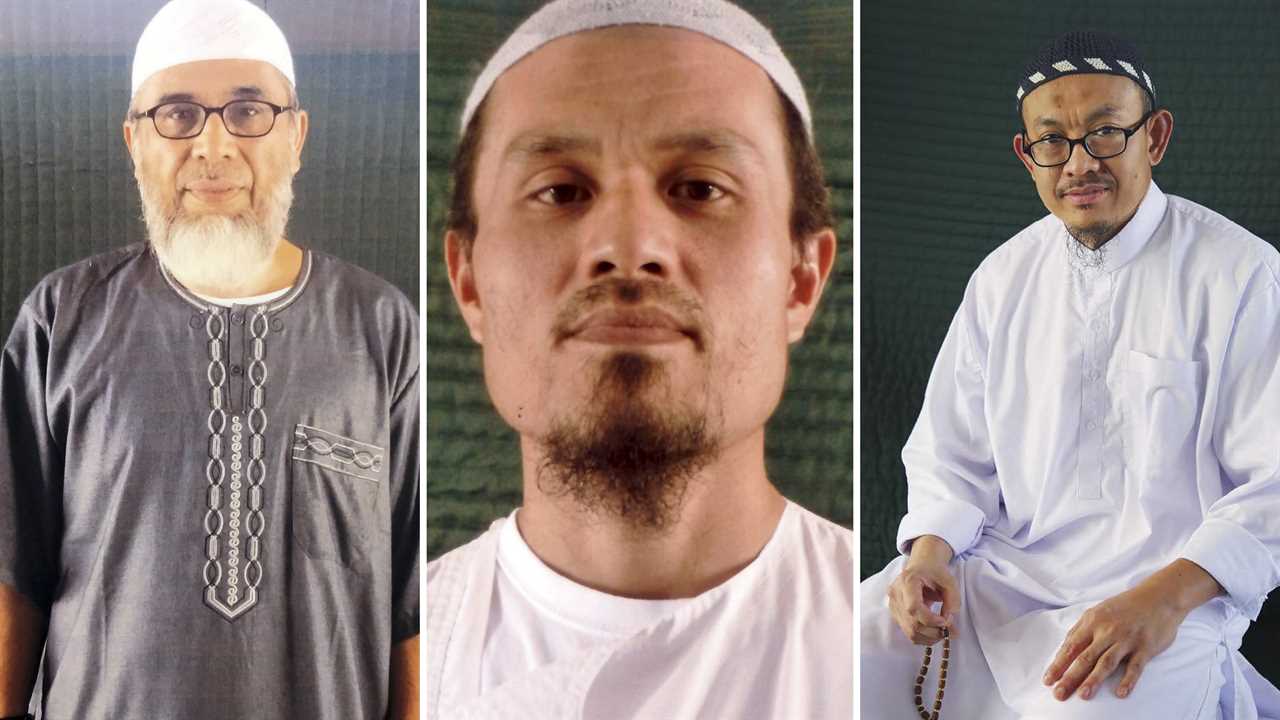
GUANTÁNAMO BAY, Cuba — Three men who have been detained by the United States for 18 years without charge were formally accused of war crimes on Tuesday as part of a global Qaeda conspiracy that began in Afghanistan in 1996 and resulted in the grisly Bali nightclub bombings in 2002.
The lead defendant, an Indonesian man called Encep Nurjaman, who is known as Hambali, and two Malaysian men, Mohammed Nazir Bin Lep and Mohammed Farik Bin Amin, offered no pleas. No trial date was set, and defense lawyers indicated they would seek to disqualify the arraignment of their clients as defective because of translation problems.
The case is the first new prosecution at the troubled military commissions system since 2014. It had been dormant for years, the men held as enemy combatants, until a Trump administration appointee abruptly approved the case on the first full day of the Biden administration without explanation.
Defense lawyers say that potential witnesses have died or disappeared and that some of the men named as accomplices have been executed in Indonesia or killed in clashes with security services.
One key issue, the lawyers said, was the discovery that the woman who served as the court’s official translator of Bahasa Indonesian had remarked last year that “the government is wasting money on these terrorists; they should have been killed a long time ago.” Defense lawyers called her biased and sought to halt the proceeding, which was already delayed for six months because of the coronavirus pandemic.
But the Navy judge, Cmdr. Hayes C. Larsen, presiding in his first military commission case, ruled that the Pentagon-paid translators were “qualified” and “certified” by war court headquarters and so what the defendants heard in their headsets was sound.
Brian Bouffard, a lawyer representing Mr. Bin Lep, disagreed. He said, for starters, that the translations were so flawed that he had “no confidence” that the defendants understood the process, and that he had no trustworthy interpreter to assist him.
Latest Updates
- To avert a migration wave, the E.U. says it will help refugees in Afghanistan and neighboring nations.
- In a few pockets of Afghanistan, resistance fighters are still opposing the Taliban.
- The U.S. faces a series of dilemmas in dealing with a Taliban government.
Mr. Bin Lep found the translation of the proceedings into his first language, Malay, so inscrutable that he switched to his second language, Bahasa, and listened to the charges against him translated by “someone who we know would have liked it if he was summarily executed years ago,” Mr. Bouffard said.
The defense lawyers had already refused to work with their teams’ Defense Department contract linguists, translators who had been vetted by the government to receive top-secret security clearances and help them communicate with the prisoners. All three defendants were held by the C.I.A. in the early years of their detention and were tortured, according to the lawyers, who said they did not trust that the government’s choice of linguists would keep their conversations confidential.
“They’ve had 18 years to get us translators and interpreters for these guys,” said James Hodes, Mr. Hambali’s lead lawyer. “But the system is so flawed.”
Understand the Taliban Takeover in Afghanistan
Who are the Taliban? The Taliban arose in 1994 amid the turmoil that came after the withdrawal of Soviet forces from Afghanistan in 1989. They used brutal public punishments, including floggings, amputations and mass executions, to enforce their rules. Here’s more on their origin story and their record as rulers.
The case is complex, charging murder, terrorism, attacking civilians and conspiracy. The charges cast two bombings in Indonesia in 2002 and 2003 as acts of war by a Qaeda affiliate after the attacks of Sept. 11, 2001. On a Saturday night in Bali in October 2002, suicide bombers struck at two popular nightspots, Paddy’s Pub and the Sari Club, killing more than 200 people, mostly Australians and Indonesians as well as seven Americans.
In a sweeping charge sheet, which an Air Force prosecutor read aloud in English for about 95 minutes Tuesday, Mr. Hambali was described as ordering recruits to his Jemaah Islamiyah movement to plot bombings of “bars, cafes or nightclubs frequented by ‘Westerners’ in Indonesia, Malaysia, the Philippines, and Thailand” in late 2001 and early 2002. It also described Mr. Hambali as so aware of what would happen in Bali that he arranged to rent a hotel room in advance to watch the news on CNN.
The charges did not directly tie the Malaysian defendants to the Bali bombing. Instead, they were described as associates of Mr. Hambali who trained in Qaeda camps in Afghanistan and, at his direction, conducted surveillance in 1999 of other U.S., Israeli and tourist targets in Southeast Asia for plots that never took place. They were also accused of helping him elude capture by securing fake documents, weapons and safe-house lodging.
Mr. Bin Lep and Mr. Bin Amin are also accused of hiding $50,000 at their apartment in Bangkok that Khalid Shaikh Mohammed, who is accused of masterminding the Sept. 11 attacks, sent for follow-on attacks in 2002. Prosecutors suggested it was used to fund a car bombing at a Marriott hotel in Jakarta, Indonesia, in August 2003, killing 11 people and wounding at least 80 others.
By then, Mr. Bin Amin had been arrested. The other two men would soon be detained, and like him, spend more than three years in secret C.I.A. prisons before President George W. Bush had them transferred to military custody at Guantánamo Bay with Mr. Mohammed and 10 other so-called high-value detainees.






